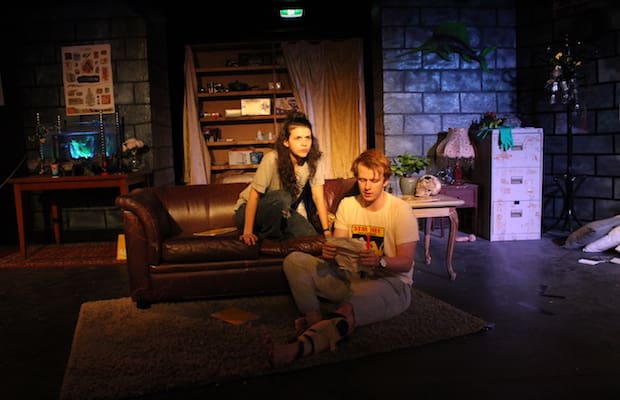A boy, a girl, a bunker, and some fish. It might not sound like it, but these are the beginnings of a fantastic play.
Directed by the very talented Harrison Epstein, SUDS’ BOOM — written by Peter Sinn Nachtrieb — chronicles the end of times through the eyes of Jo (Emma Murray), a journalism student and Jules (Alec Farrow), a marine biology student. Brought together by a Gumtree ad, the two must survive the apocalypse while at the same time, surviving each other.
Packed to the brim with dark, existentialist and slightly offensive humour, BOOM knew what it was and what it wanted to be. Upon entering the Cellar Theatre, the audience was greeted with the upbeat tones of R.E.M.’s It’s the End of the World as We Know It, effectively setting the tone for the rest of the evening.
Although the plot was simple enough, BOOM was anything but. Guiding the audience through a deeply intimate exploration of humanity, mortality and tropical fish. The play left the audience reflecting about the role of fate, the finiteness of life and the extent of human selfishness.
SUDS’ BOOM took what I can only call a ‘two-pronged’ approach while engaging with the audience, and this was all in thanks to the excellent direction and detailed and apt set, expertly designed by Braie Tato. With the set split into two separate and unique spaces with their own individual happenings, there was always something intriguing for audiences to marvel at. Whether it be from the idiosyncratic reactions of Barbara (Nicola Czaplinski) from her far-left booth or the ardent bickering happening between Jo and Jules centre-stage, the audience was kept on their toes by the constant action. The minimalist costuming, sound, and lighting design — done by Felix Faber, Matthew Forbes, and Lincoln Gidney respectively — lent themselves well to the play, allowing the actors and audience to focus solely on the characters and blossoming relationships onstage.
All three performances were highly impressive, with Murray’s Jo and Farrow’s Jules having such fantastic chemistry between them that audiences became invested in their fates very quickly. The outstanding performance from the play however, would have to be Czaplinski’s Barbara, who gave audiences reprieve from the play’s underlying serious themes. Charged with the difficult task of directly interacting with and speaking to the audience, Czaplinski succeeded with their charm and wide-eyed passion. At times it became difficult to remember that it was, in fact a play happening onstage.
BOOM’s one glaring drawback was its obviously American context and origins. The Australian accented actors paired with the niche American cultural references, meant that at times the jokes do not quite land. The ones that did, however, were excellently timed.
With an ending that can only be described as bittersweet, BOOM forces the audience to consider their own lives and dispositions, leaving a long-lasting impression even as we walked right off campus.





